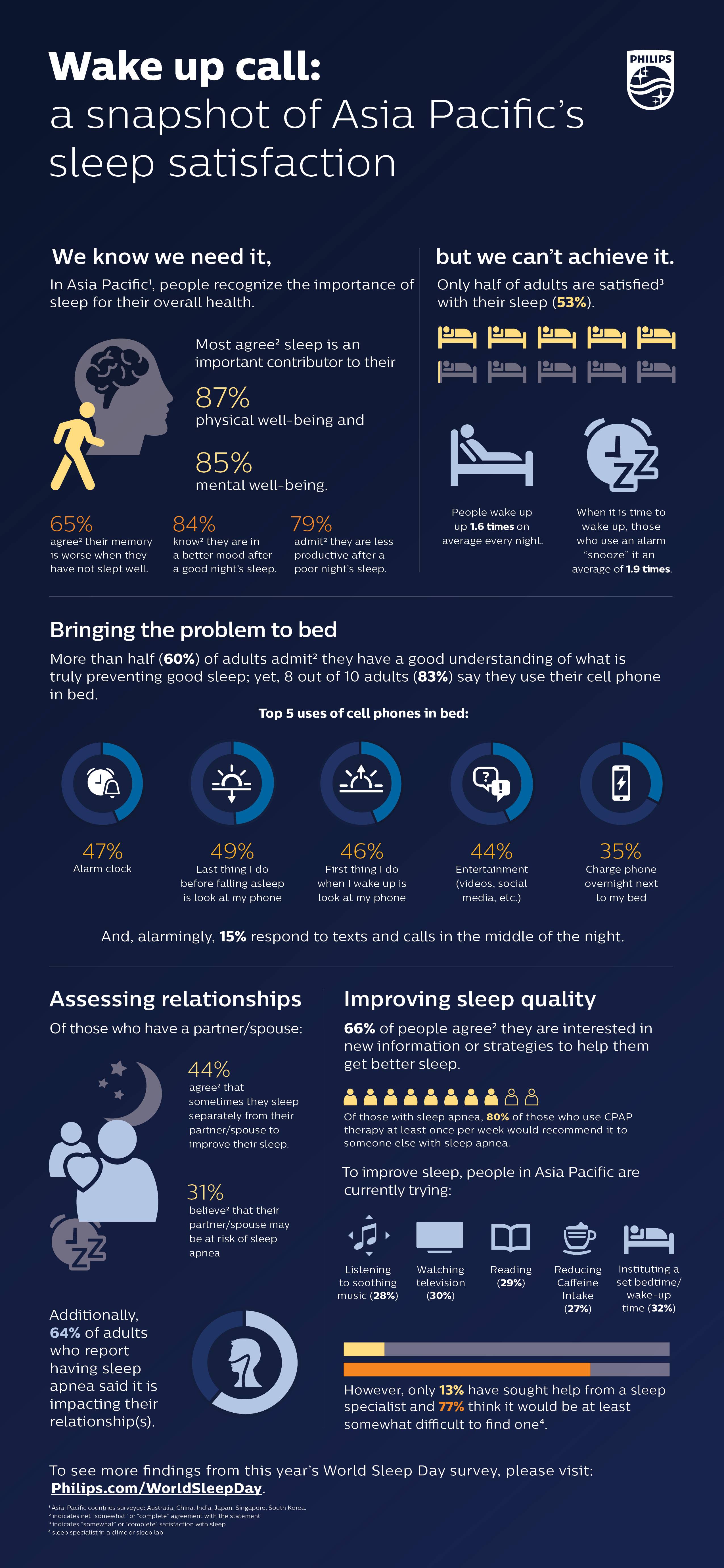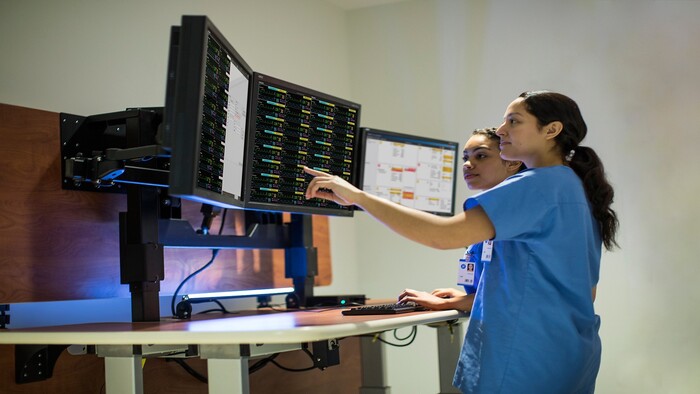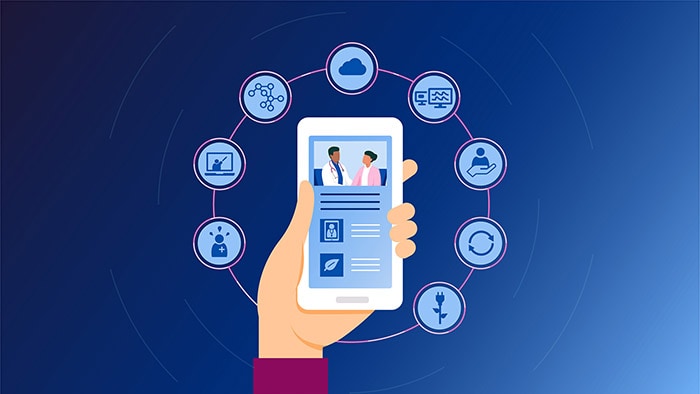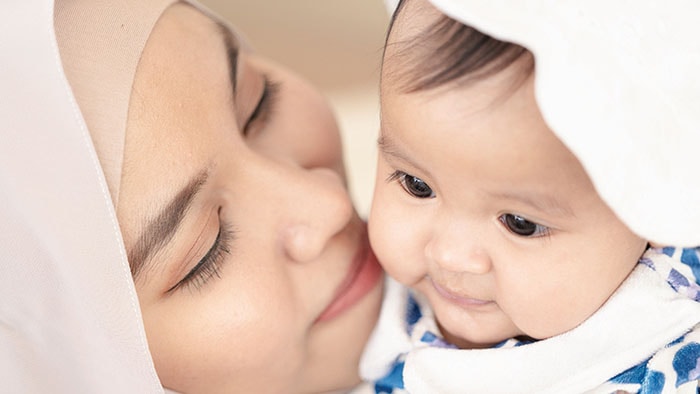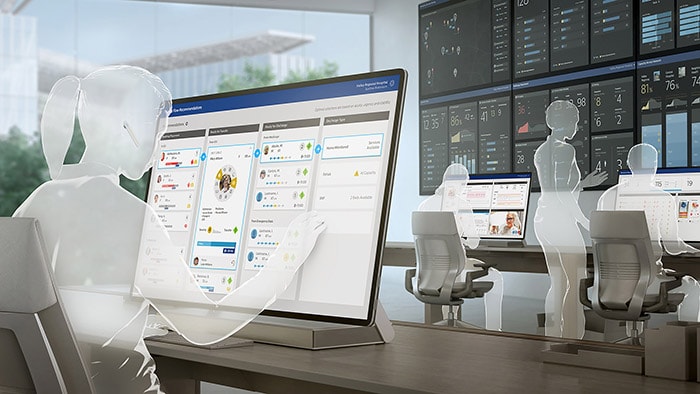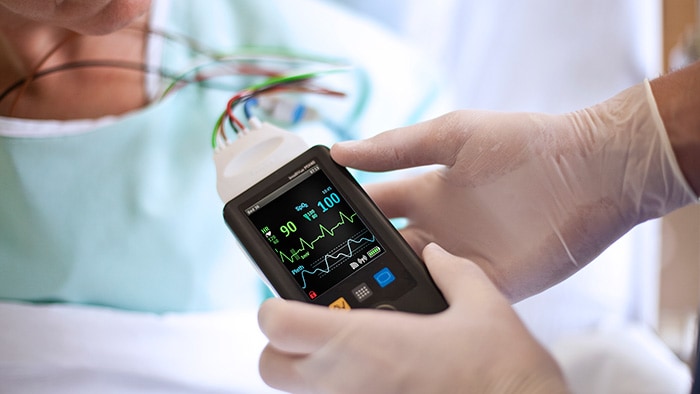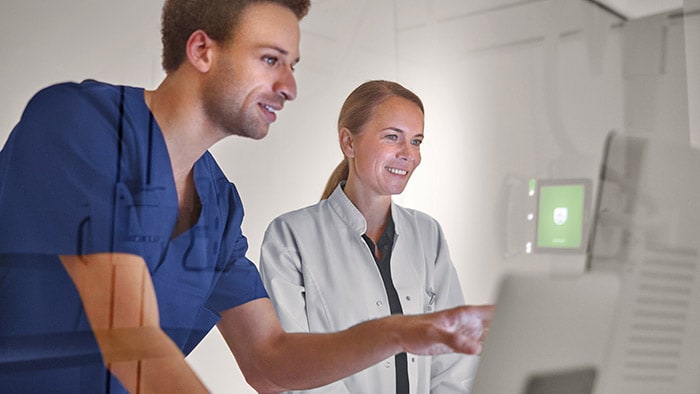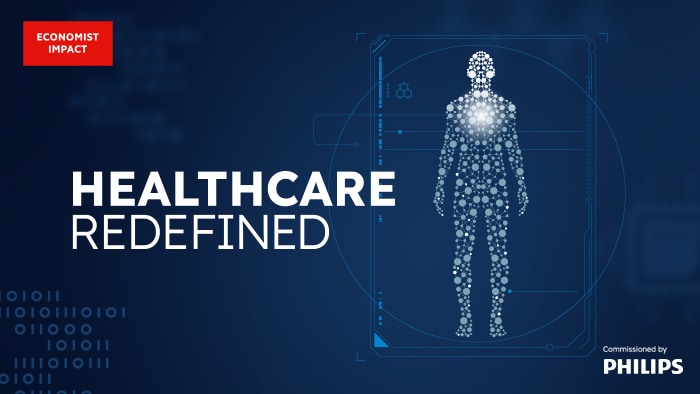Mar 13, 2020
Philips global sleep survey reveals an alarmingly sleep-deprived world
Manila, Philippines - People around the world are now sleeping even lesser each night, with 7.0 hours of sleep per night (vs 7.1 hours in 2019) – 6.8 hours on weekdays (similar to 2019) and 7.5 hours on the weekend (vs 7.9 hours in 2019). This finding was among others announced by Royal Philips (NYSE: PHG, AEX: PHIA), a global leader in health technology, in its 5th annual sleep survey, “Wake Up Call: Global Sleep Satisfaction Trends”. (Information of survey below). Sleep helps the body redistribute energy resources that are primarily used for brain and muscle work to the immune system[1]. Clocking in at least seven hours of good night’s sleep on a regular schedule can reduce stress levels and improve overall well-being[2].
This year’s results also revealed that getting sufficient sleep remains a challenge for many around the world – whether in Asia Pacific (APAC), the Americas or Europe – with those surveyed averaging just 7.0 hours of sleep per night. The situation is more worrying for adults in the APAC countries surveyed3, who get an average of 7.1 hours of sleep per night. While the quantity of sleep is close to global average number of hours, sleep satisfaction of adults in the region remains low. Almost half (47%) feel that they are not satisfied with their sleep, and over 1 in 3 (35%) of them believe getting adequate sleep is beyond their control. Poor sleep quality is evident in form of restlessness, and eight in 10 adults in APAC (79%) waking up at least once during the night. Just over half say they have a good understanding of what prevents them from getting good sleep (60%), or know what they can do to tackle their sleeplessness (58%). Looking at the factors that most inhibit sleep, worry or stress continues to be the top reason (29%), along with one’s sleeping environment including noise, light and temperature (15%), mobile devices like phones or tablets (13%) and health conditions such as pain or breathing problems (9%).
Good sleep continues to evade many
Mobile addiction causing sleep woes With more than half of the world’s mobile subscribers living in APAC[1], it is unsurprising that most APAC adults (83%) who were surveyed use their phones in bed, despite experts’ recommendations not to do so. Half of APAC respondents (49%) say the last thing they do before falling asleep is looking at their phone, higher than 39% of global adults surveyed, and 46% of APAC adults look at their phone as soon as they wake up in the morning (vs 39% of global adults). Around 15% even respond to texts and calls that wake them up through the night, preventing them from getting uninterrupted rest. Hurdles in seeking treatment or diagnosis Philips’ global sleep survey found that the fear of the unknown is a limiting factor for people getting diagnosed for sleep conditions, such as obstructive sleep apnea (OSA). Over a quarter (29%) of adults in APAC believe they might be at risk of OSA, yet 26% are afraid to take a sleep test because they do not want to know if they have OSA. As a seldom-discussed, under-diagnosed condition, OSA is characterized by repeated interruptions in breathing throughout the sleep cycle, preventing oxygen from reaching the lungs[2]. Symptoms of OSA include choking or gasping for air during sleep, loud and persistent snoring and excessive daytime fatigue, and poor concentration during the day. “Although it’s positive that people now see the importance of sleep for overall health, it’s still troubling that many are unable to get a restful night of sleep and not wanting to know that they suffer from OSA,” said Ashwin Chari, country manager, Philips Philippines Inc. “If left untreated, sleep apnea can have serious short and long-term health risks including heart disease, type 2 diabetes, stroke and high blood pressure. We would strongly urge people to get themselves diagnosed and be treated.”
In search of a good night’s sleep Faced with the lack of quality sleep, 66% of APAC adults also say they are interested in new information and strategies to improve their sleep. To combat their sleep woes, those in APAC this year are experimenting with a variety of methods, including reducing their caffeine consumption (27%), instituting a set bedtime or wake-up schedule (32%) and reading (29%) in pursuit of better sleep. “The decrease in people taking action to improve sleep is alarming, especially when it is clear people around the world deeply value sleep. Sleep deficit impacts people both mentally and physically, so we need to educate people on available sleep resources and empower them with the confidence that their efforts will pay off,” said Mark Aloia, PhD, Global Lead for Behavior Change, Sleep & Respiratory Care at Philips. To learn more about the Global Sleep Survey and Philips’ commitment to improving access to sleep technology worldwide, visit Philips.com/WorldSleepDay.
Average hours of sleep across global countries surveyed
| Country | Hours of sleep (per night averaged across the week) | Hours of sleep | Hours of sleep |
| Global population | 7.0 | 6.8 | 7.5 |
| Japan | 6.6 | 6.4 | 7.0 |
| United Kingdom | 6.7 | 6.6 | 7.0 |
| South Korea | 6.8 | 6.5 | 7.4 |
| United States | 6.8 | 6.7 | 7.0 |
| Italy | 6.8 | 6.6 | 7.3 |
| Australia | 6.9 | 6.8 | 7.2 |
| Singapore | 6.9 | 6.7 | 7.5 |
| Germany | 6.9 | 6.7 | 7.5 |
| India | 7.0 | 6.7 | 7.7 |
| Netherlands | 7.0 | 6.9 | 7.4 |
| France | 7.1 | 6.9 | 7.7 |
| Brazil | 7.2 | 7.0 | 7.6 |
| China | 7.3 | 7.0 | 8.1 |
| Country | Look at their phone as the last thing before falling asleep | Look at their phone as soon as they wake up in the morning | For entertainment (e.g. watching videos, scrolling social media) |
| Global population | 39% | 39% | 34% |
| China | 57% | 53% | 50% |
| Singapore | 51% | 45% | 49% |
| South Korea | 51% | 53% | 37% |
| Brazil | 49% | 55% | 47% |
| India | 43% | 40% | 45% |
| Australia | 35% | 39% | 31% |
| United States | 34% | 42% | 34% |
| Japan | 33% | 33% | 24% |
| Italy | 31% | 32% | 27% |
| France | 26% | 33% | 25% |
| Germany | 26% | 24% | 17% |
| United Kingdom | 26% | 30% | 24% |
| Netherlands | 22% | 24% | 19% |
About Royal Philips
Royal Philips (NYSE: PHG, AEX: PHIA) is a leading health technology company focused on improving people's health and enabling better outcomes across the health continuum from healthy living and prevention, to diagnosis, treatment and home care. Philips leverages advanced technology and deep clinical and consumer insights to deliver integrated solutions. Headquartered in the Netherlands, the company is a leader in diagnostic imaging, image-guided therapy, patient monitoring and health informatics, as well as in consumer health and home care. Philips' health technology portfolio generated 2019 sales of EUR 19.5 billion and employs approximately 80,000 employees with sales and services in more than 100 countries. News about Philips can be found at www.philips.com/newscenter
About the Survey
This survey was conducted online by KJT Group, Inc. on behalf of Philips from November 12 – December 5, 2019 among 13,004 adults ages 18 and older in 13 countries (Australia: n=1,000; Brazil: n=1,000; China: n=1,001; France: n=1,000; Germany: n=1,000; India: n=1,000; Italy: n=1,000; Japan: n=1,001; Netherlands: n=1,001; Singapore: n=1,000; South Korea: n=1,000; United Kingdom: n=1,000; and the U.S.: n=1,001). The survey was web-based and self-administered in the primary language(s) of each country. These were non-probability samples and thus a margin of error cannot be accurately estimated. For complete survey methodology, including weighting variables, please contact Meredith Amoroso at meredith.amoroso@philips.com.
Topics
Contacts
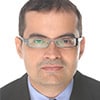
Sheo S. Rai
Senior Manager
Brand and Communications
Philips ASEAN Pacific
Media assets
Philips global sleep survey reveals an alarmingly sleep-deprived world
